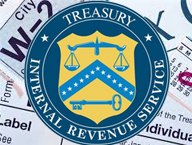Solutions
CFEG believes that the identity theft-based tax refund fraud crisis can be solved or prevented. However, it will take a variety of tools and methods to accomplish the goal of stopping billions of dollars from being stolen from the United States Treasury through the hands of identity thieves.
 Technology – CFEG believes that the IRS should improve its technology and computer systems in such a way that when a tax return is filed electronically the information set forth in the tax return is matched with other data such as W-2s, 1099s, W-9s and other IRS forms which have been logged into IRS computer systems. If matches do not occur the return should be flagged as a potential fraudulent return and the refund should be delayed until the IRS has received answers to its questions.
Technology – CFEG believes that the IRS should improve its technology and computer systems in such a way that when a tax return is filed electronically the information set forth in the tax return is matched with other data such as W-2s, 1099s, W-9s and other IRS forms which have been logged into IRS computer systems. If matches do not occur the return should be flagged as a potential fraudulent return and the refund should be delayed until the IRS has received answers to its questions.
 Legislation – CFEG has provided a list of the bills which have been introduced in Congress. These bills, if passed into law, will have a profound impact on reducing the amount of money stolen from the Treasury through identity theft.
Legislation – CFEG has provided a list of the bills which have been introduced in Congress. These bills, if passed into law, will have a profound impact on reducing the amount of money stolen from the Treasury through identity theft.
 IRS Resources – CFEG believes that the IRS should allocate most, if not all available resources, including personnel, to combat identity theft-based tax refund fraud between the months of January and April of each tax year because the data shows that most identity thieves strike during the height of tax season.
IRS Resources – CFEG believes that the IRS should allocate most, if not all available resources, including personnel, to combat identity theft-based tax refund fraud between the months of January and April of each tax year because the data shows that most identity thieves strike during the height of tax season.
IRS Advisory Council 2012 Public Report – CFEG believes that the recommendations of the IRS Advisory Council’s 2102 Public Report will go a long way to solving or preventing the identity theft- based tax refund fraud problem. These recommendations are as follows:
- The IRS should strongly consider delaying refunds until after verification of the taxpayer’s identity. For taxpayers that rely on an early refund in January, the IRS should consider a process under which 25 percent of the refund is issued prior to verification, and the remaining 75 percent issued after verification. The increased use of refund anticipation loans needs to be considered if refunds are delayed.
- The IRS should continue to work with the banking industry to find and prosecute the perpetrators who use debit cards.
- Authentication procedures should continue to be studied so that refunds can be processed more quickly for those taxpayers whose identity is authenticated. It may be possible to allow authentication to be made by a third party. Consideration should be given to requiring fingerprints or other unique identifiers that can be associated with the social security number on the income tax return as authentication. This could be done by local police or other approved groups and included by the taxpayer on the signature line of the return.
- It may be possible to publicize the protections that the IRS has in place and the need to slow down refunds until information returns can be matched or verification can occur. This could be used in conjunction with requiring Form W-2s and Form 1099s to be filed with the IRS by January 31, the same date that forms are furnished to taxpayers. In addition, the IRS can publicize the importance of properly estimating taxes payable each year to avoid significant overpayments that may be delayed due to a verification process.
- The IRS needs to continue its Criminal Investigation Division work with and prosecution by the Justice Department, making results public so that the consequences of identity theft are understood by the public.
- The IRS should consider continued expansion of the IP PIN for taxpayers who have had their identity stolen, and perhaps for all taxpayers who request refunds before verification. There also needs to be a method of connecting a child’s identity to their parent’s return to protect the child’s SSN from identity theft.
- Identity theft is an ongoing issue, which the IRS must deal with in order to protect the tax system. With the landscape continuously changing, identity thieves continue to create new ways of stealing personal information and using it for their gain. The IRS must continue to look for ways to improve its return processing to ensure potentially false returns are screened out at the earliest possible stages of processing. With the integrity of the tax system at stake and budgets struggling, it appears that the easiest way to combat identity theft tax fraud is to delay refunds until verification of identity can be made. While the cost of this will be taxpayer frustration with delayed refunds, the gains achieved by stopping fraudulent returns from being filed and fraudulent refunds from being issued far outweigh this frustration. By aggressively controlling this risk now, the integrity of the tax system will be less of a target in the future.


